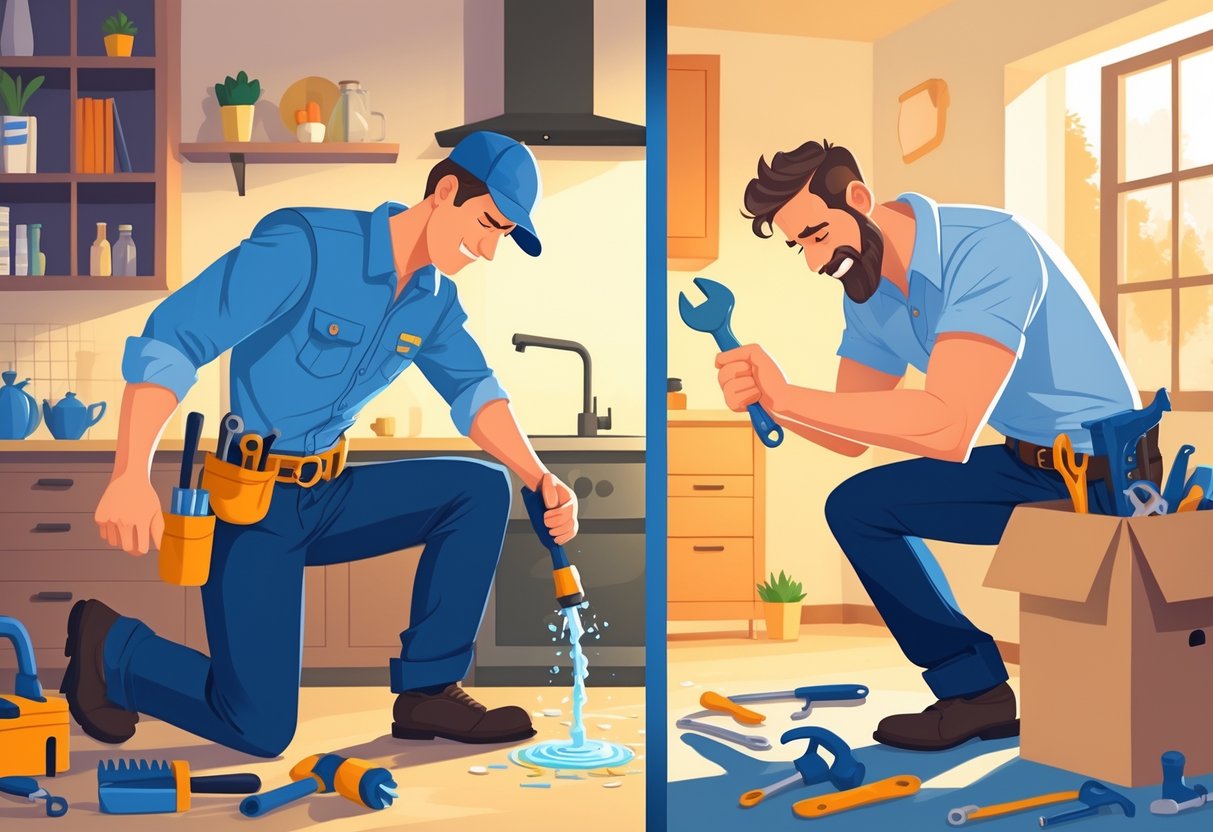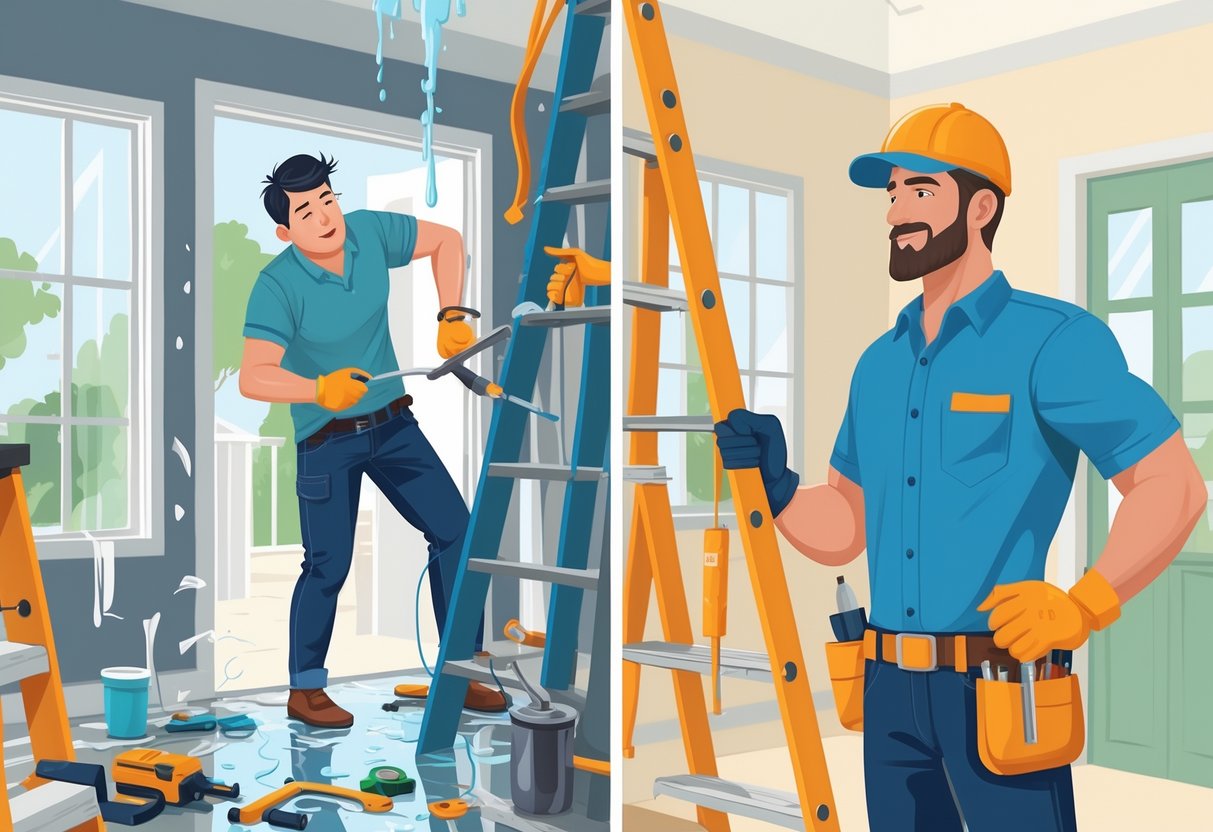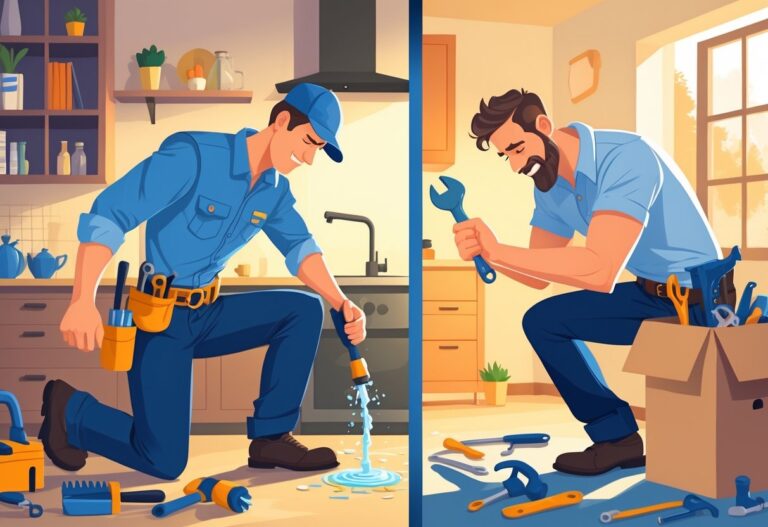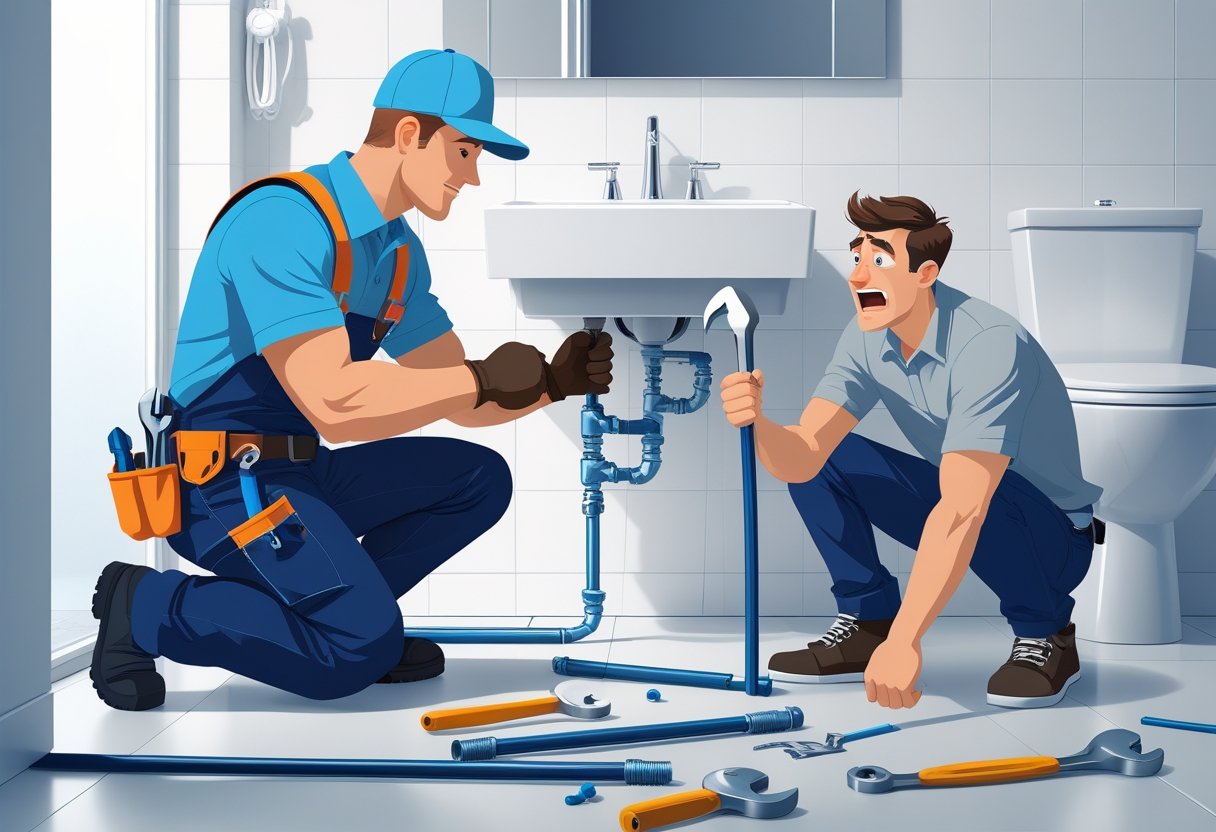When something breaks or needs updating around the house, you might find yourself stuck between grabbing your toolbox or calling in a pro. Both choices hit your wallet and your peace of mind, but the right call can save you a lot of hassle.
Knowing when to tackle a project yourself and when to hand it off to a skilled handyman can make a real difference. You’ll save time, money, and maybe a few headaches along the way.

Professional handymen bring expertise, proper tools, and efficiency that can prevent costly mistakes and ensure quality results. DIY projects can be fun and budget-friendly for simple jobs, but complicated repairs? Those usually need more know-how than most of us have.
The difficulty of the project, your comfort with tools, and how much free time you’ve got—those are the big deciding factors. Some jobs are just better left to the pros.
Need a Home Fix – Emergency or Routine?
From leaks and no-heat nights to simple tune-ups, our 24/7 hotline connects you with trusted local pros in minutes.
Key Takeaways
- Professional handymen provide expertise and proper tools that prevent costly mistakes on complex projects
- DIY projects work best for simple tasks when homeowners have the right skills and time available
- The decision should consider project complexity, safety risks, and long-term value to the home
Key Differences Between DIY and Hiring a Professional Handyman
DIY home improvement means you do it all yourself, using your own tools and whatever skills you’ve picked up along the way. On the flip side, professional handyman services send in trained experts who know what they’re doing and have the right gear for the job.
What Constitutes DIY Home Improvement
DIY covers any task you can finish without professional training. Usually, you just need basic tools and a willingness to follow online tutorials or instructions.
Think painting walls, installing shelves, caulking windows, or replacing light fixtures. These are the kinds of jobs most folks can knock out in an afternoon, no permits needed.
DIY projects often involve:
- Basic hand tools like screwdrivers, hammers, and drills
- Simple materials from your local hardware store
- Step-by-step instructions that don’t require an engineering degree
- Low risk of injury or property damage
Lots of people handle small repairs and cosmetic updates themselves. Patching a hole in the wall, swapping out a doorknob, or adding a bit of trim—these are classic DIY territory.
The main thing is that DIY tasks don’t need special training or a license. If you’re comfortable with a screwdriver, you’re probably good to go.
Understanding Professional Handyman Services
Professional handyman services send skilled workers to tackle repairs and installations that most homeowners would rather not touch. These folks have training, experience, and tools you probably don’t keep in your garage.
Handyman services cover electrical work, plumbing repairs, structural modifications, and appliance installations. You need to know building codes, safety rules, and technical details for these kinds of jobs.
Professional handymen bring several advantages:
- Specialized tools and equipment for tricky jobs
- Knowledge of local building codes and permit rules
- Insurance coverage in case something goes wrong
- Warranty protection on the work they do
They handle stuff like installing ceiling fans, fixing leaky pipes, repairing outlets, or building custom storage. A lot of these jobs need permits or an inspection to keep things safe and up to code.
Pros usually finish jobs a lot faster than most DIYers. Their experience helps them avoid the kind of mistakes that can turn a small problem into a big one.
Assessing Skill Level and Project Complexity
Your skill level should guide you. Basic projects make sense for beginners, but complex tasks really do call for experience.
Simple projects—like hanging pictures, tightening screws, or replacing air filters—don’t take much skill and aren’t risky if you mess up.
Medium-complexity projects? Think installing bathroom fixtures, building deck railings, or wiring new outlets. These need a little more know-how and some attention to safety.
High-complexity projects, like structural repairs, major electrical upgrades, or complicated plumbing, really should go to a pro. You don’t want to gamble with your safety or your house.
Key things to think about:
- Time—do you have enough to learn and do the job?
- Tools—do you own what you need, or will you have to buy or rent?
- Safety—is there a real risk if things go sideways?
- Permits—does the job need one?
Be honest about your abilities. If something feels out of your league, it probably is. That’s when it’s smart to call in a pro.
The Benefits of Hiring a Professional Handyman
Professional handymen show up with skills and experience, making sure repairs get done right the first time. They know the codes, handle permits, and deliver work that adds value to your home for the long haul.
Expertise and Efficient Problem Solving
A pro handyman has seen it all. Years of fixing things mean they spot problems right away—stuff that might leave you scratching your head for hours.
Professional handymen have knowledge across multiple trades. Plumbing, electrical, carpentry—you name it, they’ve probably done it.
They know which tools to grab and which techniques really work. Experience helps them dodge the rookie mistakes that can trip up DIYers.
| DIY Approach | Professional Handyman |
|---|---|
| Trial and error | Proven methods |
| Basic tools | Professional-grade equipment |
| Learning curve | Immediate expertise |
They often catch small issues before they become expensive disasters. That’s a huge stress-saver.
Quality Workmanship and Long-Term Value
Professional handymen deliver results that last. They usually back up their work with warranties or guarantees, which gives you some peace of mind.
They use good materials and proven techniques. That attention to detail keeps things working and looking right for years.
Quality workmanship means you’re not calling them back to fix the same thing twice. When they repair something, it tends to stay fixed.
The long-term value from hiring a pro often outweighs the up-front cost. You get projects done right, and they stay that way.
Handymen keep up with new tools and best practices. They know which products and methods will actually hold up in your particular situation.
Navigating Building Codes and Permits
Building codes exist for a reason: safety. Professional handymen know these rules and follow them.
They can tell you when permits are needed and handle the paperwork. That way, you avoid headaches with the city down the line.
Local codes change all the time. Handymen keep up with those changes so you don’t have to.
If you skip permits, you might run into trouble when selling your house. Handymen take care of permits and inspections from the start.
They know what inspectors want to see, which helps your project pass the first time. That’s one less thing to worry about.
They’ll also let you know which jobs actually need permits and which ones don’t. Their advice can save you time and money.
Common Scenarios: When to DIY Versus When to Hire
Deciding if you should DIY or call a pro usually comes down to how complicated the job is, how risky it might be, and whether you’ve got the right skills. Painting a room or routine maintenance? Go for it. Electrical work or roof repairs? Better call in someone who knows what they’re doing.
Simple and Safe Repairs for Homeowners
Plenty of homeowners can handle the basics. These projects are safe, need only common tools, and don’t mess with complicated systems.
Painting is a classic DIY job. All you need are some basic supplies and a little patience. Most folks can figure it out pretty fast.
Simple plumbing fixes like stopping a leaky faucet or swapping out a toilet seat are good DIY options. No major risks, just a few tools and some elbow grease.
Basic maintenance tasks include:
- Changing air filters
- Caulking around tubs and showers
- Installing new cabinet hardware
- Hanging pictures or shelves
- Cleaning gutters (if it’s a single-story house)
Patching nail holes, changing out door handles, or quieting a squeaky hinge—these are perfect for building your confidence and skills.
Home Repairs That Require a Professional
Some repairs are just too risky or complicated to do yourself. These jobs need someone who’s trained and knows the safety rules.
Electrical work should always go to a pro. Mistakes can cause fires or worse. Plus, you usually need a permit and inspection.
Roof repairs mean working up high, which is dangerous. Roofers have the right safety gear and know the codes and warranties.
Major plumbing repairs—like moving pipes or fixing sewer lines—can cause big water damage if done wrong. Leave these to the experts.
Structural changes affect your home’s safety. Removing a wall or adding beams? That’s definitely not a DIY job.
Other jobs that need a pro:
- HVAC system repairs
- Gas line work
- Foundation repairs
- Window and door installation
Balancing Time, Cost, and Safety Concerns
Before you decide, weigh three things: safety, time, and cost.
Safety always comes first. If the job involves electricity, heights, or structural work, let a pro handle it. They’ve got insurance and training for a reason.
Time is a biggie. Small repairs might take a weekend. Bigger jobs can drag on for weeks if you’re learning as you go. Professionals work faster and usually get it right the first time.
Cost isn’t just about labor. DIY means buying tools and materials, and your time matters too. If you make a mistake, fixing it can get expensive.
Be honest about your skill level. Start with small projects to build confidence, but know your limits. Some jobs just aren’t worth the risk.
If a project needs permits, special tools, or expert knowledge, call a pro. Routine maintenance and small fixes? Those can be satisfying DIY wins.
Cost Considerations and Value Over Time

The real cost of home repairs isn’t just about the sticker price. Labor, hidden fees, and long-term impact all play a role.
Professional handyman services might look pricey upfront, but they tend to offer better value over time.
Comparing Labor Costs for DIY vs. Hiring
Labor usually makes up 30-50% of the total bill when you hire someone. For a $20,000 renovation, that’s $6,000-$10,000 just for labor.
DIY skips that labor charge, but you’ll be trading money for your own time. What takes a pro four hours might eat up your whole weekend—16 hours or more.
Time value calculations:
- Average hourly wage: $25
- DIY time: 16 hours = $400 in lost time
- Professional time: 4 hours = $100 in lost time
- Professional labor cost: $300-500
How much you actually save with DIY depends on your own hourly rate and how tricky the project is. Painting? Sure, that’s a win. Plumbing or electrical? Not always.
Specialized skills cost more, but pros get things done fast. They usually finish in a single visit, while DIYers can drag things out for weeks.
The Hidden Expenses of DIY Projects
Buying tools for DIY jobs can get expensive fast. Sometimes, those specialty tools for a one-off repair cost more than just hiring someone.
Common hidden DIY costs:
- Tool rental or purchase: $50-300
- Multiple material trips: $20-40 in gas
- Permit fees: $25-200
- Correction supplies: $30-150
Material waste creeps up on you. Pros get exactly what they need, but homeowners often end up with leftover materials gathering dust.
Mistakes can double your costs. Mess up the tile job? You might have to rip it all out and start over—ouch.
Learning as you go slows things down. First-timers work slower and usually make more errors than someone who does this for a living.
Don’t forget safety gear. Proper ladders, masks, and protective equipment add up, and most homeowners overlook these extras.
How Professional Repairs Can Save Money Long-Term
When pros do the job right, you dodge future repair bills. Quality materials and proper installation mean fewer headaches later.
Professional work often comes with a warranty—sometimes up to three years. DIY jobs? No such luck. If something fails, it’s all on you.
Long-term value benefits:
- Reduced callback repairs
- Higher resale value
- Code compliance assurance
- Insurance claim protection
Pros spot hidden issues before they blow up into emergencies. They can catch small problems that might cost you big down the road.
Solid workmanship prevents chain-reaction disasters. Bad plumbing work, for example, can lead to water damage—suddenly, you’re looking at thousands in repairs.
Insurance companies often don’t cover damage from DIY electrical or plumbing work. Hiring a pro gives you liability protection and keeps your coverage intact.
Getting permits and inspections done right means your home stays up to code. That keeps your property value safe and prevents nasty surprises when it’s time to sell.
Potential Risks and Challenges of DIY

DIY home repairs can open a can of worms—think code violations, safety hazards, and even insurance headaches. Sometimes, those risks just aren’t worth the few bucks you might save.
Common Mistakes and Code Violations
Lots of DIY projects miss the mark on local building codes. Most folks just don’t have the technical know-how. Electrical work is especially tricky; one wrong move and you risk fire or a failed inspection.
Plumbing mistakes often mean leaks, water damage, or expensive code fixes. It’s not always as simple as it looks on YouTube.
Common DIY code violations include:
- Improper electrical outlet placement
- Insufficient insulation installation
- Incorrect plumbing venting
- Structural modifications without permits
Permits are required for most big repairs, but lots of people skip them. Local codes change all the time, and pros stay on top of that stuff—DIYers, not so much.
Find a code violation during a home sale? That can stall your deal or drop your asking price. Buyers notice unpermitted work and often use it to negotiate.
Safety Hazards Associated with DIY Home Repairs
Without the right training and gear, DIY projects can get dangerous fast. Mess up electrical work and you’re risking shocks or fires. Roof repairs? Falls are all too common.
High-risk DIY activities include:
- Electrical repairs and installations
- Structural modifications
- Roofing and gutters
- Gas line work
- Asbestos or lead paint removal
Power tools injure thousands of amateurs every year. Ladder accidents happen all the time, especially when folks try to cut corners on safety. Even the fumes from paints or adhesives can cause breathing problems or skin issues.
DIY injuries sometimes land people in the ER—and those bills add up. For tricky or risky repairs, hiring a pro really does make sense.
The Impact on Home Value and Insurance
Sloppy DIY work drags down home value and can make insurance a pain. Unprofessional fixes stick out to buyers and inspectors, making your place harder to sell.
Insurance companies might deny claims if they trace damage back to DIY repairs. Faulty wiring or plumbing can void your policy, and some insurers specifically exclude unpermitted work.
Insurance and value impacts include:
- Claim denials for DIY-related damage
- Reduced home appraisal values
- Required professional corrections before sale
- Higher insurance premiums in some cases
DIY projects that go sideways often need a pro to fix them anyway. By then, any savings you hoped for are long gone.
Choosing the Right Approach for Your Home
Deciding between DIY and hiring a handyman really comes down to being honest about your skills, your time, and how tough the job is. Sometimes it’s a balancing act, and knowing when to call in a pro is half the battle.
Evaluating Personal Skills and Available Time
Take a good look at your experience before diving in. Painting a wall or swapping a light fixture? Most folks can handle that. But when it comes to electrical or plumbing, you need real know-how.
Time counts, too. What takes a pro two hours might eat up your entire Saturday—or even multiple weekends—if you’re not prepared.
Consider these key factors:
- Tool ownership and familiarity
- Previous project outcomes
- Physical limitations
- Safety knowledge
If your project involves structure, wiring, or plumbing, it’s probably time to call a pro. DIY attempts on complicated stuff can turn into costly headaches fast.
Experience with similar jobs matters more than just being “handy.” Good with woodwork? That doesn’t mean you can tile a bathroom. Each task has its own tricks.
Tips for Finding a Qualified Handyman
Start your search by checking online reviews and asking around at local hardware stores—they usually know who’s reliable. Don’t just go with the first name you hear.
Always verify credentials. Licensed handymen should have insurance and meet your area’s requirements. Ask for references and actually call them—it’s worth the extra step.
Get written estimates from at least three pros. Don’t just look at price; compare:
| Factor | What to Check |
|---|---|
| Materials | Quality and brand specifications |
| Timeline | Realistic completion dates |
| Warranty | Coverage period and terms |
| Cleanup | Who handles debris removal |
Good handymen are up front about the scope of work. Be wary if someone asks for a big chunk of money before starting or can’t show you a license.
Double-check their business registration and insurance. Legitimate pros won’t hesitate to share this info. If something feels off when you meet, trust your gut.
Making the Best Decision for Home Improvement Success
Match the job to your skills and what you have to work with. Basic maintenance like caulking or touch-ups? Most people can handle that. Anything structural or involving systems—leave it to the experts.
Budget for more than just materials. DIY mistakes can end up costing more than hiring a handyman in the first place. Don’t forget about tools, supplies, and possible do-overs.
If it’s an emergency—water leaks, electrical issues—get a pro in right away. No amount of confidence replaces real expertise when safety’s on the line.
Create a decision framework:
- Simple maintenance: DIY appropriate
- Moderate repairs: Evaluate skills honestly
- Complex installations: Hire professionals
- Safety-critical work: Always use experts
Don’t rush DIY projects just to save time. Sloppy work leads to safety issues and poor results. Pros usually finish faster and with fewer headaches.
Think about how your choices affect your home’s value. Bad DIY work can lower resale prices and create long-term problems. Professional jobs often come with warranties and peace of mind.
Frequently Asked Questions
Costs swing a lot between hiring a pro and doing it yourself. It depends on the job’s complexity and what materials you need. Pros save you time and offer guarantees, but DIY can work if you’ve got the skills—just be honest about the risks and what the job really demands.
What cost differences can one expect between professional handyman services and taking the DIY approach?
Handyman services cost more upfront than DIY, no doubt. But the real price tag is a little more complicated.
DIY means you’ll need to buy tools, materials, and maybe permits. People often forget to budget for these extras.
Handymen show up with their own gear, so you don’t have to buy that tile cutter you’ll never use again.
Labor is the biggest chunk of a pro’s bill. Small jobs might run $100-300, but bigger projects can hit $1,000 or more.
Mess up a DIY job and the fix could cost more than hiring a pro in the first place. It’s a risk.
DIYers often buy more material than they need. Pros know how much to get and can snag better prices.
How do the quality of work and guarantees compare when choosing a professional handyman over DIY solutions?
Most handymen offer warranties—sometimes 30 days, sometimes a full year, depending on the job. That’s a nice safety net.
DIY jobs don’t come with any guarantees. If something fails, you’re fixing it yourself or paying out of pocket.
Handymen have training and experience. They know the right methods and follow building codes.
DIY quality is a roll of the dice. If you don’t have experience, you might end up redoing the work—or paying someone else to.
Pros usually get it right the first time, which means fewer callbacks and less hassle down the road.
DIY projects sometimes lack those finishing touches. Professionals sweat the details and it shows in the end result.
In terms of time management, how does hiring a professional handyman weigh against doing it yourself?
Professional handymen usually finish projects way faster than most DIY attempts. Their experience—and the right tools—really speeds things up.
DIY projects eat up a lot of time. Most homeowners chip away at repairs on weekends or after work, so jobs can drag on for weeks.
Professionals stick to business hours. That means you get to keep your regular routine without much disruption.
Planning and researching for DIY takes up a surprising chunk of time. You’ve got to learn techniques, gather materials, and prep your workspace.
Handymen show up ready with everything they need. If you’re doing it yourself, you’ll probably make a few extra trips to the hardware store for things you forgot.
Complex DIY projects can stretch into months. Meanwhile, a handyman often wraps up similar work in just days or weeks.
What are the potential risks associated with DIY home repair versus professional handyman services?
Professional handymen carry insurance. If something goes wrong, you’re covered and not on the hook for liability.
DIY projects can be risky if you’re inexperienced. It’s not uncommon to see injuries from electrical shock, falls, or even just mishandling tools.
Handymen follow safety protocols and use the right protective gear. It’s part of their routine.
DIY electrical work is especially dangerous. Messing up wiring can start fires, cause electrocution, or lead to code violations that mess with your home insurance.
Handymen know when you need permits. If you skip permits on a DIY job, you could run into legal headaches or hurt your home’s resale value.
DIY mistakes sometimes cause structural damage. Bad repairs can make your home less safe and cost a lot to fix later.
How does the complexity of the job influence the decision to hire a professional handyman rather than attempting DIY?
Simple stuff—like painting or fixing a leaky faucet—works for DIY. You don’t need much experience or fancy tools for those.
But bigger renovations? That’s a different story. Anything with electrical work, major plumbing, or structural changes really calls for a pro.
Sometimes, the tools you need for a project are just too specialized or expensive to justify buying. In those cases, hiring a handyman actually makes more sense.
Building codes can make things tricky. Professionals know the local rules and keep your project up to code.
Multi-step jobs require good coordination. Handymen understand how to sequence the work and spot problems before they blow up.
As jobs get more technical, the need for real experience goes up. Advanced repairs aren’t something you can just wing after watching a YouTube video.
When considering safety, what are the advantages of using a professional handyman over DIY methods?
Professional handymen actually get safety training. They know the right way to handle dangerous tools and materials, which is pretty reassuring.
Insurance protection covers the work they do. If something goes wrong, homeowners aren’t left dealing with liability headaches.
They bring proper equipment, which really cuts down on safety risks. Commercial-grade tools are designed with safety in mind, and pros know how to use them.
When it comes to hazardous stuff like asbestos, lead paint, or harsh chemicals, you want someone who knows what they’re doing. Professionals have that expertise.
Working at heights? That’s just asking for trouble if you’re not prepared. Handymen show up with the right ladders, scaffolding, and fall protection gear.
And if something does go sideways, pros know how to respond. They’ve usually got a plan, and sometimes even direct lines to emergency services.







Leave a Reply